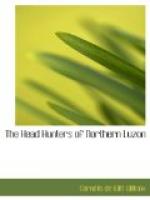CHAPTER XXIV
Tobacco industry.—Tuguegarao.—Caves.—The Cagayan River.—Barangayans.—Aparri.—Island of Fuga.—Sail for Manila.—Stop at Vigan.—Arrival at Manila.
The great valley in which we now found ourselves really deserves more notice than perhaps it is suitable to give it here. As everyone knows, it furnishes the best tobacco of the Islands, tobacco that under proper care would prove a dangerous rival to that of Cuba, though it can never quite equal the product of the Vuelta Abajo. The cattle industry should prosper here—in fact, did a few years ago; the broad savannas, some of which we had crossed, furnishing excellent pasturage. It was proved long ago that this region was naturally adapted to the culture of silk and to the raising of indigo and sugar-cane. While tobacco was a Government monopoly, [42] the valley was wealthy, traces of wealth being still found in the hands of the people under the form of jewels, some of them costly and beautiful.
The passage of the Payne bill has already brightened the prospects of the people, and especially of the small growers, for prices paid on the spot have already gone up very considerably. The valley is sure to flourish before many years shall have passed, and nothing else would so much hasten this end as the completion of the railway from Manila. But when we passed through, a sort of general apathy seemed to fill the air: the people were listless, and so much of the tobacco crop as we could see looked neglected. A partial explanation is to be found in the belief, wide-spread in these parts at this time, that the comet had come to mark the end of all things, and that any work done would be wasted. This belief, however, did not check the native and courteous hospitality of the people; all of us were taken in for the night, Evans and I going to Senor Cipriano Pagulayan’s, where we found an excellent dinner awaiting us—in particular, coffee of superlative excellence. Don Cipriano was very modest about it, explaining that the coffee had been roasted only after our arrival and ground just before it was set on; but none the less it was admirable. Now, this coffee, of course, was grown in the valley, and there is no reason why its cultivation should not be taken up on a large scale for export.
Enrile held us only for the night. The next morning we all mounted, alas! for the last time, and, escorted by a great number of local magnates, took the road for the river. Here we left our mounts to Doyle, who was to return with them to Baguio. It was with great regret that I parted from Bubud: he had carried me faithfully and well, and I shall not soon forget his saucy head, looking after us as we got down the bank to go on board the motor-launch of the Tabacalera. [43]




